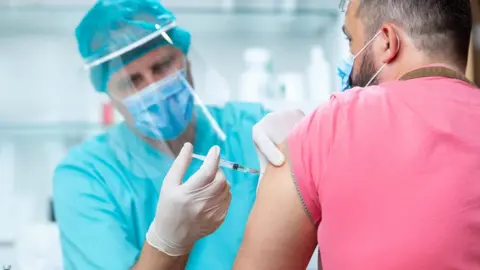Covid-19: World's first human challenge trials to start in UK
 Getty Images
Getty ImagesHealthy, young volunteers will be infected with coronavirus to test vaccines and treatments in the world's first Covid-19 "human challenge" study, which will take place in the UK.
The study, which has received ethics approval, will start in the next few weeks and recruit 90 people aged 18-30.
They will be exposed to the virus in a safe and controlled environment while medics monitor their health.
The UK has given doses of a Covid vaccine to more than 15 million people.
Human challenge studies have played a vital role in pushing the development of treatments for a number of diseases, including malaria, typhoid, cholera and flu.
The trials will help scientists work out the smallest amount of coronavirus needed to cause infection, and how the body's immune system reacts to it.
This will give doctors a better understanding of Covid-19, the disease caused by the virus, which will feed into the development of vaccines and treatments.
'Unique insights'
The Human Challenge study is being delivered by a partnership between the UK government's Vaccines Taskforce, Imperial College London, the Royal Free London NHS Foundation Trust and the company hVIVO, which has pioneered viral human challenge models.
Clive Dix, interim chair of the Vaccines Taskforce, said: "We have secured a number of safe and effective vaccines for the UK, but it is essential that we continue to develop new vaccines and treatments for Covid-19.
"We expect these studies to offer unique insights into how the virus works and help us understand which promising vaccines offer the best chance of preventing the infection."


We have hugely effective Covid-19 vaccines already so why do we need challenge trials?
First, they tell us things that are almost impossible to discover in the real world.
How much virus does it take to start an infection? How does the immune system mount its initial defence? Can you tell which people will develop symptoms or not?
The trials in the UK will start off by focusing on these fundamental scientific questions.
But there are also new vaccines in the pipeline and the virus itself is evolving.
Later this year it will become almost impossible to run large-scale Covid vaccine trials in the UK because so many people will have been immunised.
But challenge trials involving just a small numbers of volunteers will still give the answer to crucial questions - from how second-generation vaccines compare, to whether vaccines protect against new variants.

Chief investigator Dr Chris Chiu, from Imperial College London, said: "We are asking for volunteers aged between 18 and 30 to join this research endeavour and help us to understand how the virus infects people and how it passes so successfully between us."
Volunteers will be screened to check they are healthy and have not been infected by the virus before. They will have the virus squirted up their nose and then spend 14 days quarantining in hospital, while being closely monitored by a medical team.
Compensation
Finding out how the virus grows in the nose and analysing the very early stages of infection in people before symptoms develop are two main aims.
Volunteers will be compensated for their time, to the tune of around £4,500 over the course of a year, which will include follow-up tests.
Initially, the study will use the virus that has been circulating in the UK since the pandemic began in March, which is of low risk to healthy adults, to deliberately infect volunteers.
In time, a small numbers of volunteers are likely to be given an approved vaccine and then exposed to the new variants, helping scientists to find out the most effective jabs - but this phase of the study has not yet been given the go-ahead.
